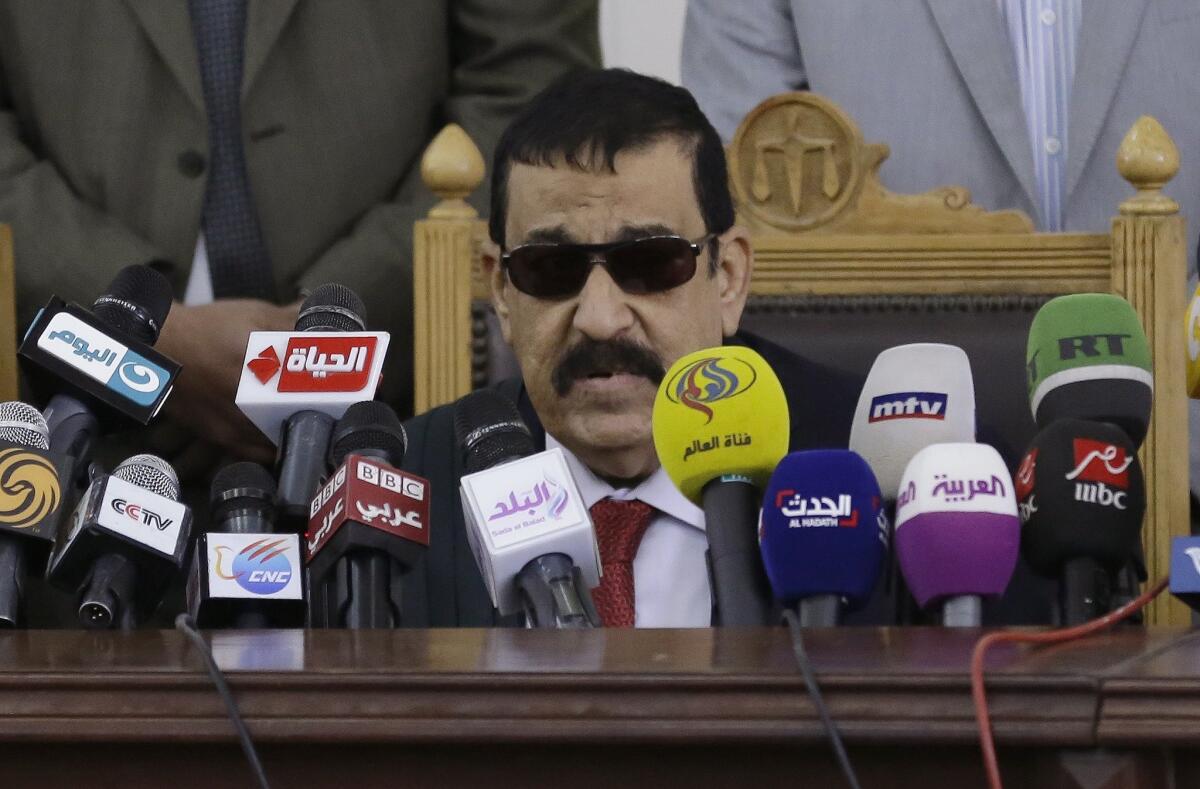Op-Ed: Egypt’s judiciary: a willing participant in repression

- Share via
Egypt’s ousted president, Mohamed Morsi, was sentenced Tuesday to 20 years in prison without parole on charges related to the killing of 10 protesters. The verdict came five months after a court dropped charges against Morsi’s predecessor, Hosni Mubarak, over the killing of hundreds of protesters who rose up against his 30-year reign in the Egyptian Revolution of 2011.
The contrast is instructive. Egypt’s judiciary, touted as independent by government officials and their sycophants, has shed any remnant of neutrality.
During the Mubarak era, judges displayed at least some degree of independence, forcing the regime to periodically resort to exceptional courts like military tribunals or state security courts to get the rulings it wanted.
But after the 2011 uprising, and the tumultuous events in its wake, state institutions panicked, adopting a siege mentality in the face of what they perceived as an existential threat. The judicial system no longer even attempts to uphold the rule of law or administer justice to its citizens; its main purpose now is to protect the state, primarily the army and police.
Judges routinely hand down harsh sentences, not just against outspoken government critics but to anyone perceived as a threat to the ruling regime. Islamists, activists, human rights advocates, civil society workers, journalists, trade unionists, students, street children and the LGBT community have all been targeted.
Meanwhile, police and public officials have received acquittal after acquittal. Despite the killing of hundreds of protesters by security forces, you would be hard pressed to find a single police officer behind bars. Despite the rampant corruption and violence of the Mubarak regime, former government administrators have all been released from prison.
In the heady days following the 2011 revolt, Egypt’s story was in the streets; mass mobilizations were a potent political force. Four years later, as a journalist covering Egypt, I feel like a court reporter. The prisons are bursting; the trials are constant.
Many trials are held in a converted lecture hall at the Police Institute inside the sprawling Tora prison complex. This is by no means a public courtroom. There are three security checks to get inside, and often only lawyers and journalists are allowed access. Family members must wait outside among police dogs and army tanks.
The caged defendants’ dock that is standard for Egyptian courtrooms has been outfitted with thick, soundproof glass, making it impossible to hear, or properly see, the accused. During recesses, communication with defendants is conducted through improvised sign language.
During the trial proceedings, defense lawyers do what they can. In the face of evidence that is almost uniformly based solely on police testimony, they present video footage and witnesses, they reference procedural law and cite the constitution, and make detailed closing arguments. But their efforts usually make little difference.
The attorney Mahmoud Bilal, who spent months representing defendants in three concurrent, protest-related cases, watched helplessly as his clients all received prison sentences ranging from two years to life.
“My colleagues and I have completely lost faith in the judiciary, but what we do is at least contribute to unveiling the violations in these cases, and make it harder for judges to issue political verdicts,” he told the local news outlet Mada Masr this month.
The rulings span the gamut from the shocking to the absurd.
In the last two weeks, a court granted the police the right to deport and ban gay foreigners; a popular belly dancer was sentenced to six months in prison for “insulting the Egyptian flag” after she performed wearing a costume bearing the flag’s three colors; 22 people accused of storming a police station and killing a police officer were sentenced to death; 14 people were sentenced to death and 37 to life in prison — including several journalists and a U.S. citizen — for organizing opposition to Morsi’s military ouster.
Those last two cases were presided over by Nagy Shehata, who has emerged as Egypt’s most notorious judge. Heavyset and mustachioed, he is famous for wearing dark sunglasses inside his courtroom. According to the privately owned newspaper Al-Tahrir, Shehata has sentenced 204 people to death and doled out 7,395 years in prison to 534 people in just five rulings. Here’s how Shehata justified sentencing three Al Jazeera journalists to jail in 2013: “The devil encouraged them to use journalism and direct it towards actions against the nation.”
Yet the problem is not confined to specific judges. It is systemic. Dissident judges have been purged; prosecutors are fully on board.
“The worst culprits in the erosion of justice, of civil society, of everything that makes life livable in Egypt are the judiciary,” the renowned writer and activist Ahdah Soueif told me moments after her nephew, the prominent activist Alaa Abdel Fattah, was sentenced to five years in prison for a peaceful protest. “It’s been such a bitter disappointment and knowledge that they could destroy a basic belief in justice that people have because they’ve decided that their interests lie with this regime. It’s unbelievable.”
The judiciary, which once acted as a curb on the regime’s most authoritarian impulses, has become a willing participant in repression. It is no longer seen as being above the political fray. If and when another revolt grips Egypt, the judicial system may well be a primary target of popular anger.
Sharif Abdel Kouddous is a Cairo-based journalist and a fellow at the Nation Institute.
Follow the Opinion section on Twitter @latimesopinion and Facebook
More to Read
A cure for the common opinion
Get thought-provoking perspectives with our weekly newsletter.
You may occasionally receive promotional content from the Los Angeles Times.









